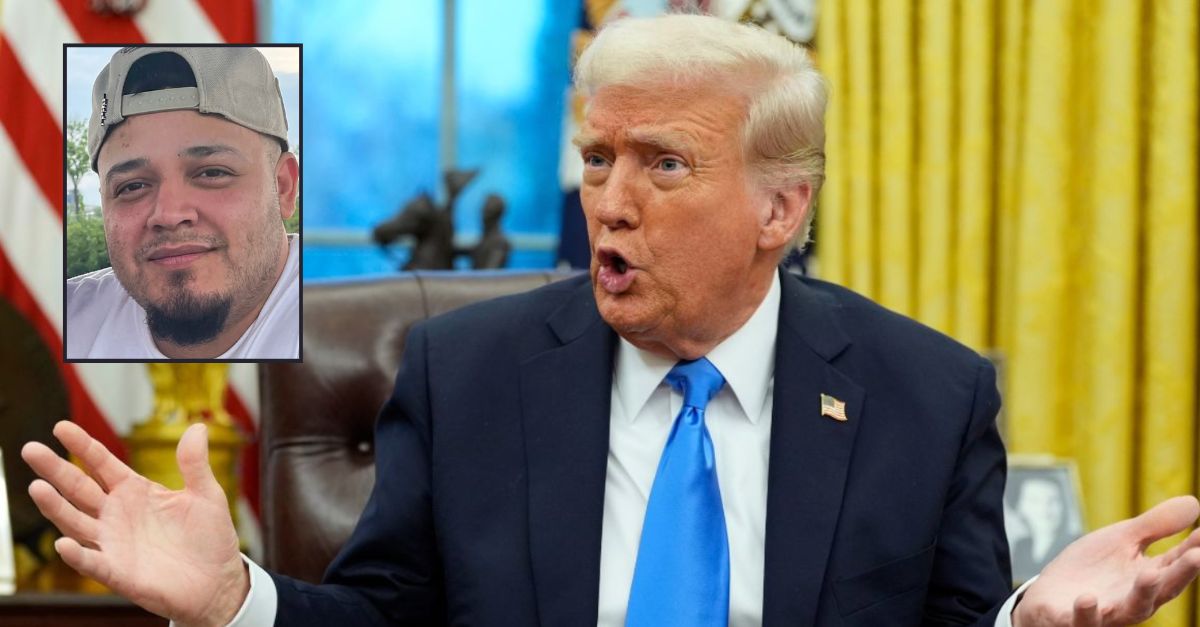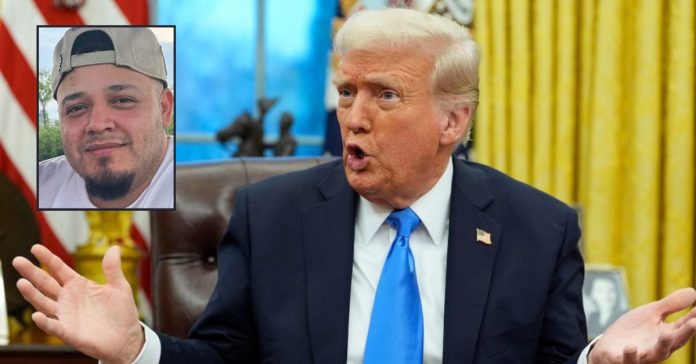
Inset: Kilmar Abrego Garcia in an undated photo (CASA). Background: President Donald Trump speaks with reporters in the Oval Office at the White House, Tuesday, Feb. 11, 2025, in Washington, D.C. (Photo/Alex Brandon).
The Trump administration is not keen on releasing potentially incriminating information about itself in the ongoing Kilmar Abrego Garcia saga, a new filing in the Maryland man”s criminal case shows.
In a seven-page status report filed Thursday, the U.S. Department of Justice bristled at discovery requests from the defense. Those requests are directly related to claims the government leveled human smuggling charges against Abrego Garcia as part of a reprisal campaign after his attorneys successfully litigated to have him freed from incarceration in El Salvador and returned stateside.
While addressing some of those arguments in the status report, the DOJ also says it has a “disagreement” with Abrego Garcia’s attorneys over several pieces of sought-after information.
Those disagreements concern two categories of “[e]mail, text, and other correspondence” involving President Donald Trump’s former personal attorney and current Deputy Attorney General Todd Blanche.
Love true crime? Sign up for our newsletter, The Law&Crime Docket, to get the latest real-life crime stories delivered right to your inbox.
In July, the defendant filed a lengthy discovery request on the U.S. Attorney’s Office for the Middle District of Tennessee.
Relevant to the present dispute, the defense requested “Material Concerning the Inception or Progress of the Investigation and Prosecution.” That letter staked out six separate categories “concerning the inception and progress of any investigation in connection with this matter and the decision to prosecute this matter.” The request makes clear the defense is detailing the floor of the information being asked for, but not the ceiling.
In August, Abrego Garcia filed a motion to dismiss his federal indictment on the basis of a selective and vindictive prosecution.
Earlier this month, U.S. District Judge Waverly Crenshaw, a Barack Obama appointee, found there was a “realistic likelihood of vindictiveness” behind the federal charges against Abrego Garcia.
By now, the immigration lodestar’s high-profile litigation is a well-known subplot of the story of the second Trump administration. Abrego Garcia was part of a summary deportation flight to a prison notorious for torture in El Salvador, but his deportation violated multiple court orders — both specific to him and general to the flight in question.
A DOJ lawyer was sacked after admitting the Trump administration’s mistakes and, through a seesawing battle that has gone up the legal ladder all the way to the U.S. Supreme Court and back down to various different district courts, Abrego Garcia was returned to the United States, promptly charged with unrelated crimes, and eventually released on bail before being taken into custody by Immigration and Customs Enforcement (ICE) yet again late last month.
The latest chapters have put Abrego Garcia on the offensive and the government on the defensive — even as the father of three remains a criminal defendant in Tennessee and still faces the prospect of third-country deportation in his immigration case.
In short, Crenshaw believes the legal morass in his district just might have something to do with all the negative attention the Trump administration has faced due to the Abrego Garcia spectacle. And, in the early October ruling, the judge said the defendant’s claims to that effect have entitled him to discovery and an evidentiary hearing.
In reaching this conclusion, the court noted comments made by Blanche on Fox News in June, apparently linking the prosecution to the consequences of Abrego Garcia’s habeas corpus lawsuit.
“To remove any doubt, Deputy Attorney General Blanche said that the criminal case was brought to return Abrego to the United States, ‘not [because of] a Judge,’ but instead, because of ‘an arrest warrant issued by a grand jury in the Middle District of Tennessee,'” the judge wrote. “This could be direct evidence of vindictiveness.”
From the ruling, at length:
Most tellingly, Attorney General Bondi’s direct report, Deputy Attorney General Todd Blanche, linked Abrego’s criminal charges to Abrego’s civil lawsuit in Maryland. Strikingly, during a television interview Deputy Attorney General Blanche revealed that the government started “investigating” Abrego after “a judge in Maryland . . . questioned” the government’s decision, found that it “had no right to deport him,” and “accus[ed] [the government] of doing something wrong.”
“Blanche’s remarkable statements could directly establish that the motivations for Abrego’s criminal charges stem from his exercise of his constitutional and statutory rights to bring suit against the Executive Official Defendants, rather than a genuine desire to prosecute him for alleged criminal misconduct,” Crenshaw went on.
Still, the court said Blanche’s statements alone “fall short on the record” to establish “actual vindictiveness” because “they require an inference tying them to actual decisionmakers.”
In the end, Crenshaw suggested discovery and arguments might aid Abrego Garcia to that end with regard to Blanche — effectively shelving the matter for the time being.
Now, however, the DOJ says that ruling works in its favor — at least insofar as it applies to Blanche and others in his position.
“[T]he scope of discovery should be narrow, not simply because of the issues of privilege at play, but because of the heart of what is at stake in the inquiry,” the Thursday motion reads. “The Court noted, for example, that comments by senior government officials ‘may come close to establishing actual vindictiveness, they fall short on the record before the Court because they require an inference tying them to the actual decisionmakers.’ The United States submits that the undersigned Acting United States Attorney was the ‘actual decisionmaker’ here.”
The DOJ goes on to say the remaining — disputed and outstanding — discovery should focus “narrowly” on “communications (or lack thereof) between senior government officials” and the acting U.S. Attorney in the Volunteer State regarding the Abrego Garcia case.
The motion then puts a fine point on their argument.
“A communication, for example, from the Secretary of Homeland Security (or her designee) directing the Acting United States Attorney to charge the case, threatening him with consequences if he did not, cajoling him, inveighing him, or otherwise attempting to inappropriately sway his judgement in prosecution matters would be discoverable (and highly probative),” the motion continues. “Such communication, however—whether written, electronic, or oral—does not exist.”

